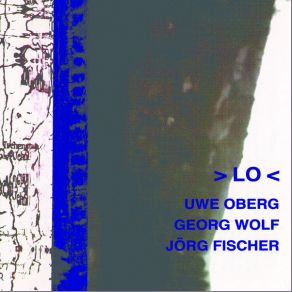>Lo<
Download links and information about >Lo< by Jorg Fischer, Georg Wolf, Uwe Oberg. This album was released in 1996 and it belongs to Jazz, Avant Garde Jazz genres. It contains 8 tracks with total duration of 01:02:46 minutes.

|
|
|---|---|
| Artist: | Jorg Fischer, Georg Wolf, Uwe Oberg |
| Release date: | 1996 |
| Genre: | Jazz, Avant Garde Jazz |
| Tracks: | 8 |
| Duration: | 01:02:46 |
| Buy it NOW at: | |
| Buy on iTunes $9.99 | |
Tracks
[Edit]| No. | Title | Length |
|---|---|---|
| 1. | Lotion | 8:19 |
| 2. | Loco | 6:51 |
| 3. | Lontano | 6:14 |
| 4. | Valid, Interim 2 | 3:33 |
| 5. | Lostloose | 6:41 |
| 6. | A Lot | 15:50 |
| 7. | Loxodrom | 10:39 |
| 8. | Valid, Interim 1(to Charlotte) | 4:39 |
Details
[Edit]The Lo trio, led by pianist Uwe Oberg, is a curious mix of free improvisation, dynamic considerations, and tonal exploratory which relies as much on the developments of the New York school of composers as it does on the jazz innovations made by Paul Bley, Cecil Taylor, and Keith Jarrett. Utilizing the liberation musicology of the prepared piano as well as normal older sister, an insanely large array of percussion instruments — including a trap kit and the front-line assault of a double bass tuned an octave lower than normal — Lo offer a Zen-like take on jazz and free improv, allowing virtually everything into their mix and investigating it with equal consideration and aplomb. On the opener, after playing the prepared piano from inside, plucking, hammering, and strumming it's strings with the pedals down, Oberg turns over the spatial element of the tune to Wolf, who looks for ways to open it up and drop the piano back inside it's large tonal framework. Fischer busies himself finding those spits by means of the accent on whatever he can get his hands on, until finally it happens. On "Lontano," huge masses of sound move slowly and purposefully though a prism of harmonic and modal dictates, filtering out essential tonalities that are then explored as a means of exchange between members. The result is an often chaotic but resonant knot of streaming colors. And on it goes through themes and variation on the letters L and O (in titles only) as some idiosyncratic language for improvisation, as if the letters and articulations of them in the human throat offer some hidden possibility for sonic exploration. Perhaps they do. But even if they are only titles, the pieces they signify offer a wealth of musical possibilities that have been heretofore un-encountered or articulated in quite this way. This is deep listening music and depends as much on the heart as the ears to decode. Lo offers a great ride through the abyss of sound and sonances.